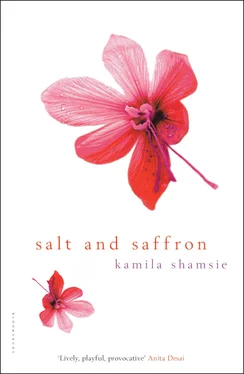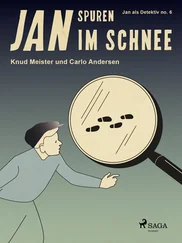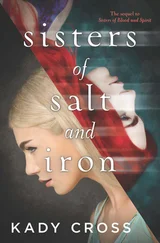So Sameer and I set off again and returned with a Turkish film, which the man at the video store told us we could keep since he had so little use for it that he really couldn’t understand what it was doing in his shop to begin with. I don’t remember what the movie was about beyond the fact that it involved chickens, a three-legged dog and a man named Murat. We would never have sat through the whole thing if Sameer and I hadn’t been too frightened of Samia’s wrath to suggest turning it off, and if Samia hadn’t been too proud to admit she’d rather watch low-brow Hollywood fare. But halfway through the movie Mariam Apa entered the TV room and laughed at the subtitle, ‘You want to rent a room?’ Then she laughed at, ‘Is that the sun?’ and almost fell off her chair at, ‘You look very pretty.’
Three months later Samia sent Sameer a postcard:
Guess what Sam 2! Remember the Turkish movie? Well, I mentioned it to my Turkish friend, Omër, and he says it’s a great comedy. Very subtle humour! He knows chunks of it by heart — translated some dialogue for me and it really was funny, though it didn’t ring any bells at all as far as my memory of the subtitles was concerned. Guess we got a lousy translation. Must go — there are strawberries.
Love, Sam 1.
P.S. How come Mariam understood the humour?
In the days that followed the arrival of the postcard I tried casually mentioning Ataturk and Istanbul and Turkish delight around Mariam Apa, but she didn’t show even a flicker of interest. Still, I never quite forgot about it.
Why would Taimur have gone to Turkey?
Back again to Taimur, that inexplicable man.
It’s true that there were relatives aplenty in the family who had been part of the Khilafat Movement just before the triplets were born, and throughout Taimur’s childhood those relatives spoke often of that political movement which tried to show the British that Muslims around the world would not accept the break-up of the Ottoman Empire. One of the uncles even stayed in Turkey for a few months, just before Ataturk declared Turkey a secular state, and after he returned he made a point of teaching all the children of the family the rudiments of the Turkish language. So it’s not inconceivable that Turkey should have had a certain hold on Taimur’s imagination. It certainly had a hold on the imaginations of most Indian Muslims of his parents’ generation, and Taimur always loved to listen to his elders’ stories. But even so … What was Taimur’s story?
Mosquitoes had begun to buzz around me so I pulled my dupatta close like a shawl, using it to shield my bare arms from the onslaught. As a child I would tell myself things like, If I stay outdoors and brave the insects for a whole hour then tomorrow the boating plan will work out. If, subsequently, the boating plan didn’t work out, it would be because I stayed outside only fifty-nine minutes, or because I cheated by lathering on calamine lotion afterwards, or because mosquitoes died in my dreams that night.
Was that childhood logic so different from my way of thinking now? If I ask the right questions the answers will come. If the answers don’t come it’s because I haven’t asked the right questions, haven’t pried out the necessary details from those who feel no pleasure in remembering, haven’t recalled that one lift of an eyebrow which changes everything. But what about the silences that can’t be retold in stories? What about the forgotten commas which shape us as much as the exclamation marks? Masood once said to me, ‘Why is it that when people exchange recipes they so often forget to mention salt?’
I had laughed then and Masood, uncharacteristically offended that I shouldn’t take him seriously, served unsalted food to the family that night.
‘What is this?’ Aba had said, staring down in horror at his plate, after just one morsel. ‘What is this?’
How the absence of a single ingredient can alter the meal before you. How the absence of a detail can alter a story. How much salt had been left out in all the stories I’d ever heard from, and about, my family? How much salt did I leave out when I turned my memories of Mariam and Masood into a story? Well, I knew part of the answer to that. I left out my own reactions. Of late I’d been telling myself that eventually, when everything was resolved in my mind, I’d put myself in the story and say that at first I’d reacted terribly. Then I went far away and allowed myself time to think about it and my mind accepted the marriage. Then, one day, so did my heart. And so I went to visit Khaleel in Liaquatabad.
If only it were that simple.
I imagined Khaleel before me, laughing. ‘Salt? How déclassé. I’d have thought you’d season your metaphors with nothing less than saffron.’
Masood loved saffron, but when he spoke about food in terms of devotion he referred back to that déclassé seasoning. ‘I believe in God because all of science can never explain the miracle of salt,’ he said and I, having learnt my lesson, nodded.
What if all of storytelling couldn’t explain Taimur?
I stood up so quickly I had to sit down again. Could it be that simple? Mariam Apa never spoke because speaking would mean trying to explain Taimur, and that she was unable to do. So she hid in menus — hid in that wondrous yet confined world of lunch and dinner and, sometimes, tea — marking out the boundaries of what she could and could not speak of. She knew, as do we all, that it is useless to say you will keep quiet on one subject, because everything is interconnected. Start talking about cricket and within five minutes you might be on the subject of yaks’ milk without a single non sequitur. Ask a person one question and you set yourself up to be asked a question in return. So Mariam asked no questions, revealed no clues, started no conversations which could sprawl beyond her control. Rather than keep quiet on one subject, she kept quiet on every subject but one. It’s the only way of keeping a secret.
Or … I squeezed my head between my hands, not knowing if I wanted my thoughts to slow down or speed up. Something was shaping inside my skull … Had all of us always been wrong about her silence? We assumed the silence was about not speaking, but what if it was about not not-listening? Did she move mute among us in order to observe? Was she so intent on listening because there was something she needed to hear? Perhaps, just as we were waiting for her to give us the answers about Taimur, she was waiting for us to help her understand why her father walked away from the family she missed so much when she was growing up. In the end, was the failure ours for being unable to hear the questions she shouted out through silence?
Or did we finally answer those questions and, in answering them, make it impossible for her to do anything except follow Taimur’s example and leave?
Two rare and remarkable things: messages from both Samia and Celeste in my in-box when I logged on to my e-mail. I knew that Samia would have something to say about tea at Baji’s with Khaleel so I clicked on Celeste’s message first.
Hey, Babe.
How’s my favourite decadent Pakistani doing? Thought of you yesterday (like that’s a rare event!) while watching an old Audrey Hepburn movie with my brother — the former metal-head has become an aficionado of fifties movies. Go figure. The movie? You guessed it — Sabrina! I’ve always enjoyed it, despite its refusal to acknowledge the rigid, though unspoken, class structure in the US, but yesterday I couldn’t concentrate on it. Kept thinking of you and Mariam and … I want to write ‘Missouri’ but I know that’s not his name. Mussood?
So, anyway, I’m still waiting to get an epiphany e-mail from you. You know what I mean. Our likeable but flawed heroine walks out from her élite neighbourhood, and, spurred on by an e-mail from her American friend (remember, in these stories someone Euro-American has to be responsible for showing our élitist Third Worlder the light), she notices the poverty in other parts of the city for the first time — No! She feels empathy for the first time — and she turns her back on her life of privilege and dedicates her days to helping the needy. Roll credits.
Читать дальше












